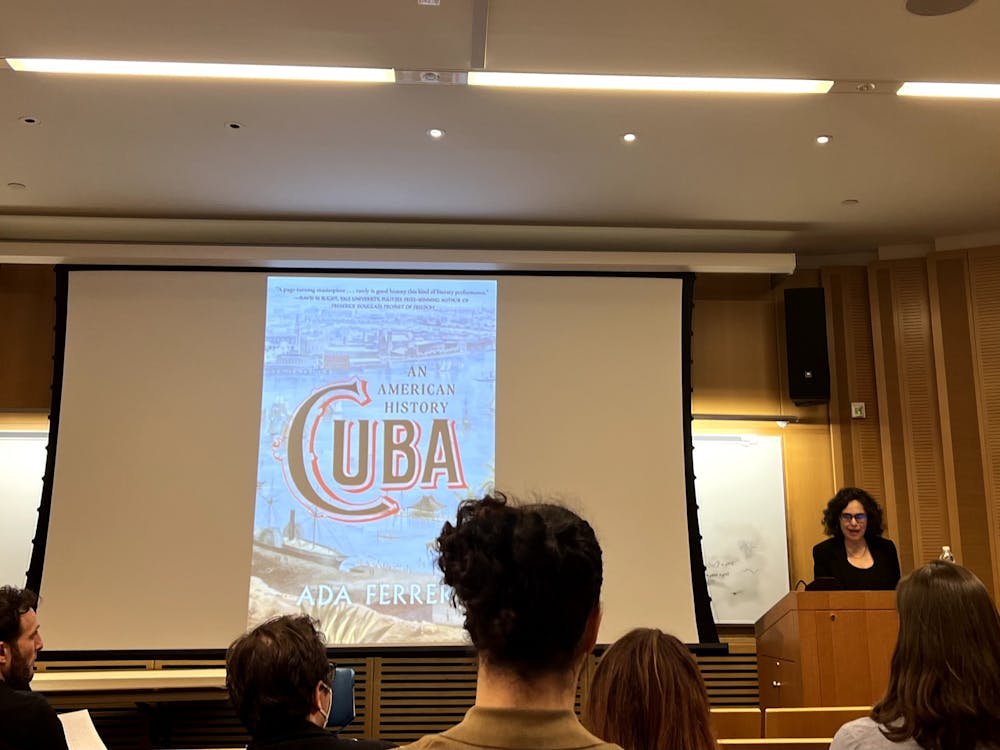Ada Ferrer gave a talk in a Leonard and Helen R. Stulman Lecture on Feb. 23. At the event, titled “Writing Between Personal and International History: Cuba: An American History,” Ferrer recounted her journey as a writer and a historian.
Ferrer is the Julius Silver Professor of History and Latin American and Caribbean History at New York University. Her Pulitzer Prize-winning book, Cuba: An American History, explores the historical relationship between Cuba and the U.S.
In an email to The News-Letter, Professor and Department Chair of the History Department Tobie Meyer-Fong elaborated on the decision to invite Ferrer for the Stulman Lecture. The lecture series aims to make academic merit accessible to a broader audience.
“She seemed like the perfect choice for this year — she won the 2022 Pulitzer Prize for History — and her work is both erudite and highly readable,” Meyer-Fong wrote. “[Her work] also touches on themes of interest to Hopkins historians: histories of slavery, the African diaspora, revolution, historical memory, and family ties.”
Sasha Turner, an associate professor in the Department of History, also hosted a lunchtime conversation between Ferrer and undergraduate History majors at Hopkins after the event.
In an interview with The News-Letter, Ferrer emphasized the importance of history in helping people view the world today.
“You can't understand the present unless you understand what came before,” she said. “Thinking about Cuba, there’s no way to understand [its] very strange relationship with the U.S. unless you understand the history of the Cuban Revolution, [which] you can’t understand unless you go back to the 19th century.”
Ferrer shared that the scope of her project was a major challenge when writing her book.
“It’s a long history and I didn't want to lose readers in unnecessary detail,“ she said. “Finding the right level to have explanation and detail to keep the reader moving was the biggest challenge [in writing the book].”
Ferrer began her talk by addressing the importance of transnational history, which shifts away from the primacy of national history and instead focuses on the connections between events.
“Human history can be many things. One of those things is a mirror to the history of the U.S.,” she said. “In telling the history of Cuba, I highlight the breadth, depth and complexity of the intimate connection [between Cuba and the U.S.] for a very long period of time. The connections stretch back over centuries [and] reach well beyond either state.”
She illustrated examples of filibusters that allowed the U.S. to secure the Cuban slave trade system against both revolution and British abolitionism from abroad.
Ferrer then spoke about the waves of out-migration from Cuba. She stressed the importance of recognizing history on the personal and family scale.
“[The history of Cuban out-migration] is not just a history of those who left [Cuba]. It is also a history of all the people left behind [and] a history of goodbyes,” she said. “Personal or family history has emerged in the last few years as a powerful and innovative mode of historical writing”
Ferrer also shared her motivation behind working on Cuban history.
“I am in this country in large part because of the history that the book tells,“ she said. “That leads me to wonder about the stories and histories that we all have in a country where people come from all over the world, driven here by the unfolding of historical events elsewhere.”
According to Ferrer, there was a new wave of interest in Cuba among Americans after Barack Obama and Raúl Castro began working to restore relations between Cuba and the U.S. She decided to dedicate her book to the history of Cuba and the U.S. after feeling a need to guide the general public.
In an interview with The News-Letter, Yushuang Zheng, a second-year doctoral student in the Department of History, highlighted how Ferrer‘s talk inspired her.
“History is not only about those big names,“ she said. “It was not only about those people who moved from Cuba to the U.S. but also those people who were left in Cuba.”
According to Zheng, the talk provided her with an opportunity to learn about history from a new perspective as a student specializing in Chinese history.
“This kind of interaction between two locations and the positionality of [Ada Ferrer] herself, [the way] she put herself into the larger picture, is very inspirational for me,” she said.
Zheng shared that after attending the talk, she wondered if she could employ a similar approach to transnational history in her own research.
At the end of the talk, Ferrer expressed hope that her book would channel the perspectives of Americans and Cubans and allow them to see history from each other’s point of view.
“Everything about Cuba is so politicized and so simplified. If you look at the Cuban state, it's this 60 years of heroism and any criticisms of the U.S. meddling,” she said. “I want to tell a history that brings [a more intimate and human] scale so that maybe people for a little while can forget those slogans and get to a place where they can imagine talking without slogans.”





